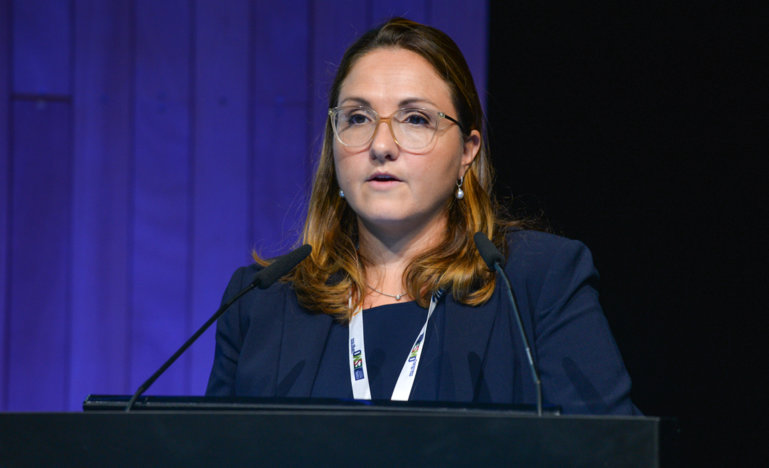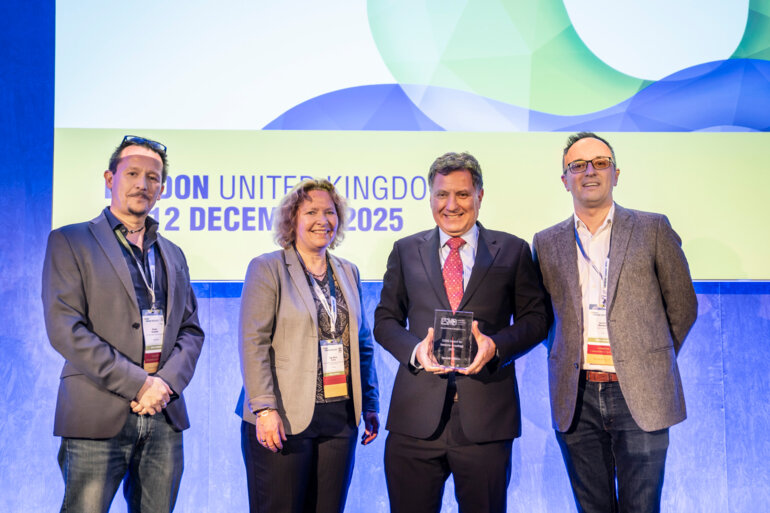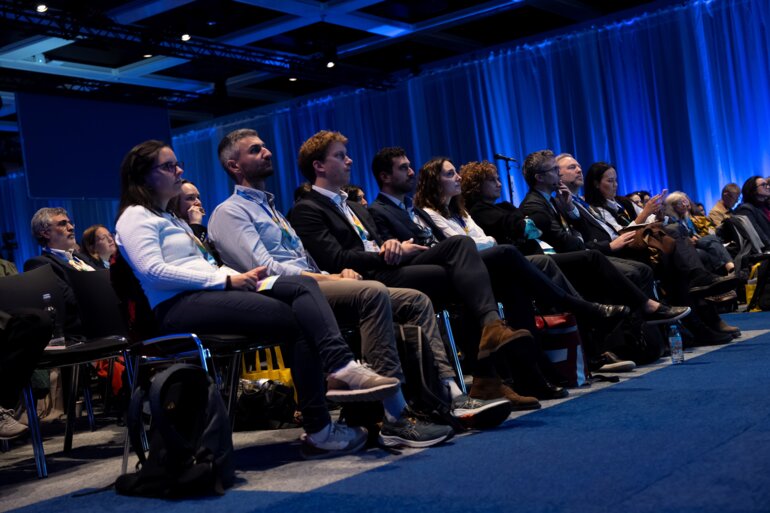Different approaches are explored, showing good efficacy and mixed tolerability, but further studies are needed to assess their feasibility
Four early-phase studies presented at ESMO Congress 2022 highlighted the expansion of immunotherapy into solid tumours. Different technologies were explored, with two studies using chimeric antigen receptor (CAR)-T-cell therapies (LBA38 and Abstract 737MO), one using a vaccine-targeted approach (Abstract 736MO) and one using T-cell receptor T-cell therapy (Abstract 735MO).
Late-breaking final phase I data from the first-in-human trial of BNT211 (BNT211-01), comprising CAR-T cells targeting tumour-specific antigen claudin 6 [CLDN6] and a CLDN6-encoding CAR-T cell-amplifying RNA vaccine [CARVac]) in patients with CLDN6-positive relapsed/refractory solid tumours showed encouraging clinical activity (LBA38). Twenty-two patients with testicular cancer (n=13), ovarian cancer (n=4), endometrial cancer (n=1), fallopian tube cancer (n=1), sarcoma (n=1), gastric cancer (n=1) and unknown primary (n=1) received CAR-T cell therapy at two different dose levels (DLs): 107 cells/patient (DL1) and 108 cells/patient (DL2). Of 21 evaluable patients, 1 had a complete response (CR), 6 had a partial response (PR), 7 had stable disease (SD) and 5 had progressive disease (PD); overall response rate (ORR) was 33% (7/21) and disease control rate (DCR) 67% (14/21)
Particularly encouraging responses were observed in patients with testicular cancer at DL2 with lymphodepletion (n=7), with ORR 57% and DCR 85% (1 CR, 3 PR, 2 SD). The one patient with CR at 18 weeks post-infusion was negative by PET-CT scan and tumour marker test. Strong persistence of CAR-T cells was observed for >100 days, with some patients showing persistence for >200 days. Two patients had dose-limiting toxicities: including 1/6 with DL2 monotherapy (pancytopenia), and 1/7 with DL2 + CARVac (haemophagocytic lymphohistiocytosis). Most grade ≥3 treatment-emergent adverse events were associated with lymphodepletion or asymptomatic transaminase/lipase elevations. Incidences of cytokine release syndrome (CRS; 45% of patients) were grade ≤3 (accompanied by high interleukin-6 levels) and manageable with tocilizumab if needed. One case of grade 1 immune effector cell-associated neurotoxicity syndrome (ICANS) was observed that quickly resolved.
“The challenge with CAR-T cells is that solid tumours vary in the expression and homogeneity of a selected target, even in different areas of a tumour. The CLDN6 target is expected to be highly expressed in certain tumours and the study showed a good response to BNT211 treatment in those with solid tumours, particularly testicular cancer,” says Dr Alessandra Curioni-Fontecedro, from the University Hospital of Zurich, Switzerland. A second first-in-human study targeting another highly expressed target, EpCAM, found that EpCAM-targeted CAR-T-cell therapy with IMC001 showed a favourable safety profile, along with SD in 6/8 patients on Day 28 (one patient turned to PR at Week 32), in patients with colorectal (n=4) and gastric (n=4) cancer (Abstract 737MO). “While this study reported anti-tumour activity with IMC001 therapy, it is also important to note that the severe treatment-emergent adverse events are common for cell-based therapies,” explains Curioni-Fontecedro. “The challenge with CAR-T-cell therapies is ensuring that the therapies reach the solid tumour as the tumour microenvironment can be highly suppressive for immune cells. The results from these two studies show that important responses are possible with CAR-T cells in solid tumours, supporting further phase II studies.” She adds that, “Different technologies with associated production issues and efficacy and safety profiles must be taken into account. Other approaches were used in two further studies presented at ESMO Congress 2022.”
Promising anti-tumour activity with an off-the-shelf neoantigen-specific vaccine in patients with metastatic solid tumours was also shown in a presentation from the phase I/II SLATE-KRAS study (Abstract 736MO). Of 13 patients with non-small cell lung cancer (NSCLC; post-immunotherapy) who received Version 1 of the vaccine (targeting 20 shared neoantigens from KRAS, TP53, b-catenin and other mutations), 4 had SD and 7 had PD (data cut-off 20 June 2022). A Version 2 vaccine developed to target KRAS mutations more effectively induced greater levels of CD8 T-cells than Version 1 in the first patients analysed. Of 12 patients treated with Version 2 (n=5 NSCLC, post immunotherapy; n=7 microsatellite stable colorectal cancer [MSS-CRC]), 1 patient with NSCLC had unconfirmed PR that turned to SD, 1 with NSCLC had SD and 1 with MSS-CRC had SD. There was a trend of improved overall survival in patients with NSCLC with versus without a molecular response (median 9.6 months versus 4.5 months). Most common (>20%) treatment-related adverse events were low-grade, pyrexia, fatigue, nausea and vomiting.
Curioni-Fontecedro advises that, “This trial used an adenovirus-based vaccine therapy to prime the immune response, followed by a self-amplifying mRNA as a booster with an immune checkpoint inhibitor. Although this appears a more complex approach than those in the first two studies, it might actually be more feasible in terms of production. While some responses were observed, the number of patients was too small to derive conclusions; however, the adverse event profile suggests the treatment is feasible.”
Finally, updated data were presented from the phase I SURPASS trial of ADP-A2M4CD8, a next-generation autologous T-cell receptor therapy, in previously treated patients with unresectable or metastatic tumours positive for melanoma-associated antigen A4 (MAGE-A4) (Abstract 735 MO), confirming those presented at ESMO 2021 (Ann Oncol. 2021;32(Suppl_5)]:S583–S620). At data-cut-off (1 August 2022) 44 patients with median MAGE-A4 expression H score of 250 (range 95–300) had received treatment. ORR (RECIST v1.1) by independent review was 28%, including 1 CR, 11 PR, and 2 patients with unconfirmed responses awaiting confirmatory scans, and DCR was 81%. Median duration of response was 12 weeks (range 7–65+ weeks). The incidence of CRS was 72.7% (grade ≥3 in 14% of patients), 11 patients (25%) experienced grade ≥3 cytopenia at Week 4 post-infusion and 2 patients (5%) had grade ≥3 ICANS.
Curioni-Fontecedro explains: “This study uses a complex peptide-enhanced T-cell therapy modified with a CD8α co-receptor and, as with cellular therapy, one of the major challenges of this approach is that only one antigen per treatment is targeted, i.e., MAGE-A4. We also need to further understand the patient population who might be eligible for this type of therapy with this specific antigen. The study showed a favourable benefit–risk profile and a response rate of 28% in heavily pre-treated patients, although as only 44 patients were included in the study, further exploration is needed for many different patient cohorts.”
While these studies report some positive data, Curioni-Fontecedro concludes that, “These four approaches have only been evaluated in small numbers of patients in early-phase trials and more work will be needed to determine if these approaches, yet promising, can translate into use in clinical practice.”
Abstracts presented:
Mackensen A, et al. BNT211-01: A Phase 1 trial to evaluate safety and efficacy of CLDN6 CAR T cells and CLDN6-encoding mRNA vaccine-mediated in vivo expansion in patients with CLDN6-positive advanced solid tumours. ESMO Congress 2022, LBA38
Proffered Paper session: Investigational immunotherapy, 09.09.2022, h. 16:00 – 17:30, Fécamp Auditorium
Fang W, et al. EpCAM-targeted CAR-T cell therapy in patients with advanced colorectal and gastric cancers. ESMO Congress 2022, Abstract 737MO
Mini Oral Session, 10.09.2022, h. 14:45 – 16:15, Orléans Auditorium
Kyi CK, et al. Personalized, off-the-shelf KRAS neoantigen-specific immunotherapy for the treatment of advanced solid tumors: clinical benefit associated with decreases in ctDNA (SLATE-KRAS). ESMO Congress 2022, Abstract 736MO
Mini Oral Session, 10.09.2022, h. 14:45 – 16:15, Orléans Auditorium
Hong DS, et al. Updated safety and efficacy from SURPASS, the phase 1 trial of ADP-A2M4CD8, a next-generation autologous T-cell receptor T-cell therapy, in previously treated patients with unresectable or metastatic tumors. ESMO Congress 2022, Abstract 735MO
Mini Oral Session, 10.09.2022, h. 14:45 – 16:15, Orléans Auditorium






